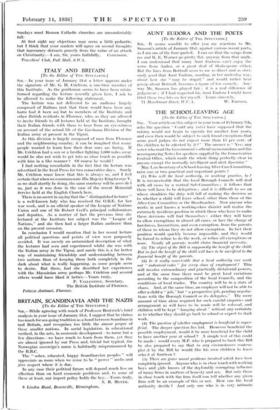ITALY AND BRITAIN
[To the Editor of THE SPECTATOR.] Sin,—In your issue of January 31st a letter appears under the signature of Mr. G. H. Crichton, a one-time member of this Institute. As the gentleman seems to have been misin- formed regarding the lecture recently given here, I ask to be allowed to make the following statement.
The lecture was not delivered to an audience largely composed of Italians (not that there would have been any harm had it been so) but to members of the Institute and other British residents in Florence, who, as they arc allowed to invite friends to all lectures held at the Institute, brought their Italian friends with them to hear from an eve-witness an account of the actual life of the Gavinana Division of the Italian army at present in the Tigrai.
As this division is largely composed of men from Florence and the neighbouring country, it can be imagined that many people wanted to learn how their dear ones are faring. If Mr. Crichton had a son or a brother fighting 5,000 miles away would he also not wish to get into as close touch as possible with him in a like manner ? Of course he would !
I find nothing remarkable in the fact that the lecture was advertised in the local Press for two consecutive days. Surely Mr. Crichton must know that this is always so, and I feel certain that when we commemorate His Majesty King George V, as we shall shortly be doing, the same courtesy will be accoi de 1 us, just as it was done in the case of the recent Memorial Service held at the English Church here.
There is no secret in saying that the " distinguished lecturer is a well-known lady who has received the O.B.E. for her war work, and is an official speaker of the League of Nations Union and one of Sir Robert Cecil's principal collaborators and deputies. As a matter of fact the previous time she lectured at the Institute her subject was the " League of Nations," and she then had a larger Italian audience than on the present occasion.
In conclusion I would mention that in her recent lecture all political questions and points of view were purposely avoided. It was merely an untarnished description of what the lecturer had seen and experienced whilst she was with the Italian army in the Tigrai, and surely this is a far better way of maintaining friendship and understanding between two nations than of keeping them both completely in the dark about what is really happening, as some people seem to desire. But there, had she described her experiences with the Abyssinian army perhaps Mr. Crichton and several others would have liked it better.—Yours truly, P. VALLENTINE, Secretary,














































 Previous page
Previous page